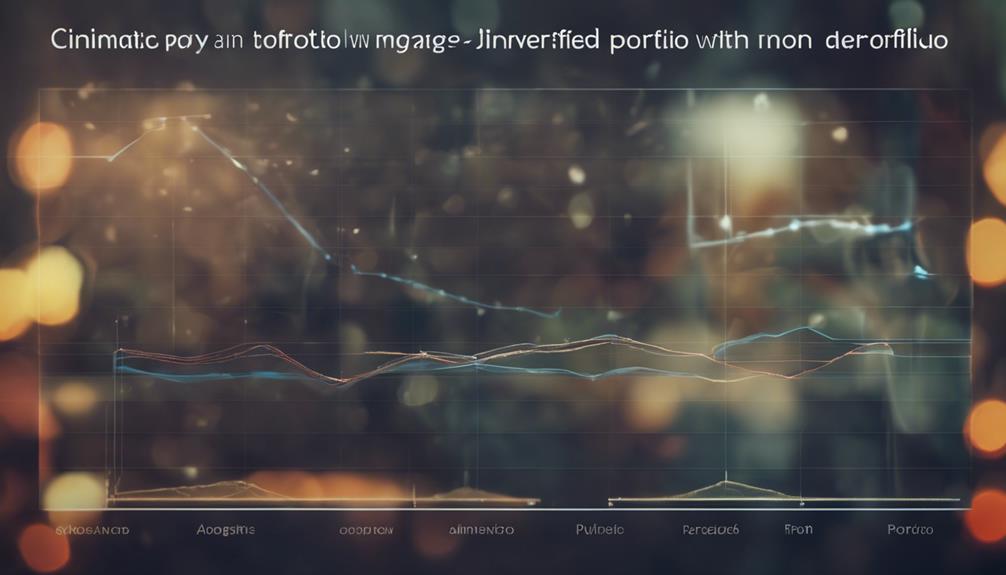IRA Investing
How to Invest in Private Equity With Your IRA
Start investing in private equity through your IRA for growth potential and tax benefits, but first, understand the key factors to make informed decisions.

Investing in private equity through your IRA involves selecting funds like venture capital or buyout funds after thorough due diligence. These investments offer growth potential and diversification, with tax benefits in retirement accounts. Understanding fund structures, performance metrics, and risks is essential for long-term growth. Accredited investor status widens your private equity options. Consider diversifying with LLCs, LPs, or C-Corporations for higher returns. Seek guidance from financial advisors, adhere to IRS guidelines, and conduct diligent research for informed decisions. Explore private equity opportunities for a well-rounded retirement portfolio. Additional insights on private equity investing await.
Key Takeaways
- Ensure IRA eligibility as an accredited investor.
- Select suitable private equity options for IRA diversification.
- Conduct thorough due diligence on chosen private equity investments.
- Consult financial advisors for guidance on IRA private equity allocation.
- Comply with IRS regulations for investing in private equity through an IRA.
Understanding Private Equity Investments
Private equity investments involve backing privately held companies with strong growth potential. When evaluating private equity investments within an IRA, it's vital to conduct thorough due diligence to make certain the selected investment aligns with your retirement goals.
In the private equity space, alternative investments can provide diversification beyond traditional assets, potentially leading to higher returns. One key advantage of investing in private equity through an IRA is the potential for tax benefits. By structuring the investment appropriately, investors can take advantage of tax-deferred or tax-free growth within the IRA, optimizing their overall returns.
Understanding the tax implications of private equity investments is essential for maximizing the benefits of this investment strategy. By utilizing an IRA to invest in private equity, individuals can potentially reduce their taxable income and grow their retirement savings more efficiently.
When exploring private equity opportunities, it's important to evaluate the long-term growth potential and the level of risk associated with these investments to make informed decisions that align with your retirement objectives.
Types of Private Equity Funds

When considering private equity funds for your IRA, it's important to understand the different types available. Venture capital funds focus on early-stage companies, buyout funds acquire established businesses, growth equity funds invest in companies with growth potential, and mezzanine funds provide financing with a mix of debt and equity.
Each fund type has its unique investment strategy and risk profile, so it's essential to compare fund structures, investment strategies, and performance metrics to make informed decisions for your retirement portfolio.
Fund Structures Overview
Understanding the various fund structures in private equity is essential for wise investment decisions. Private equity funds can be structured as limited liability companies (LLCs), limited partnerships (LPs), or C-Corporations, each with distinct tax implications and liability protection for investors.
LPs are favored for their pass-through taxation and limited liability, while C-Corporations offer liability protection but face double taxation. Investors must weigh these factors when choosing fund structures.
It's vital to grasp the differences to make informed decisions when allocating funds in private equity. By understanding the nuances of these fund structures, investors can navigate the complexities of private equity investing with confidence and control over their financial future.
Investment Strategies Comparison
Moving from the discussion on fund structures, let's now compare the investment strategies of different types of private equity funds.
Private equity funds, including venture capital, buyout funds, and growth equity funds, each have distinct approaches. Venture capital funds target early-stage companies with high growth potential, while buyout funds focus on restructuring or growing established companies. On the other hand, growth equity funds invest in later-stage companies to accelerate expansion.
These funds offer varying levels of risk and return potential based on their industry expertise and investment focus. Understanding these differences is essential for aligning your investment strategy with your financial goals.
When considering private equity investments, it's essential to assess the strategies of each fund type to make informed decisions for your retirement portfolio.
Performance Metrics Analysis
Private equity funds can be classified based on their investment focus, such as growth equity, buyout, venture capital, distressed debt, and mezzanine funds. Evaluating the success of these funds involves performance metrics like internal rate of return (IRR) and multiple on invested capital (MOIC).
IRR measures the annual growth rate of invested capital, while MOIC calculates the return multiple on the initial investment. Understanding these metrics is essential for evaluating the potential returns of different private equity funds.
Additionally, cash-on-cash return evaluates the annual pre-tax cash flow generated by the investment compared to the initial cash investment. By analyzing these performance metrics, investors can make informed decisions when selecting the most suitable private equity funds for their investment portfolios.
Due Diligence and Risk Assessment

Conducting comprehensive due diligence before investing in private equity with your IRA is vital to evaluate and mitigate potential risks. When considering private equity investments, it's essential to assess the issuer's financial stability, business model, and the current market conditions. This evaluation helps in making well-informed decisions aligned with your risk tolerance and financial goals. While private equity offers the potential for higher returns, it also comes with increased risk factors that require careful consideration. Seeking guidance from financial professionals or advisors can be valuable in understanding the complexities of these investments and minimizing risks.
| Due Diligence and Risk Assessment | ||
|---|---|---|
| Perform thorough research on the issuer's financial stability | Evaluate the business model and market conditions | Consult with financial professionals |
| Analyze risks and align with your risk tolerance | Consider the potential for higher returns | Mitigate risks through informed decisions |
IRS Regulations for IRA Investments

To guarantee compliance with IRS regulations when investing IRA funds in private equity, it's essential to grasp the guidelines outlined in IRS Publication 590 and 598. Understanding these IRS rules is vital to make sure that your IRA investments in private equity align with the established guidelines.
Prohibited transactions must be avoided when considering private equity investments to stay in line with IRS regulations. Additionally, IRA investments in private equity may trigger Unrelated Business Income Tax (UBIT) if specific criteria are met, emphasizing the importance of adhering to IRS rules.
Compliance with these regulations is fundamental in structuring IRA investments in private equity correctly. By staying informed about IRS regulations and guidelines, IRA owners can navigate the complexities of investing in private equity within the confines of the law, safeguarding their retirement savings for the future.
Benefits of Diversifying With Private Equity

Additionally, diversifying our investment portfolio with private equity presents an opportunity to access higher returns and reduce volatility. Private equity offers the potential for increased returns compared to traditional investments, making it an attractive option for enhancing long-term growth within an IRA.
By including private equity in our investments, we can also benefit from exposure to diverse sectors and industries, spreading risk across different areas of the market. This diversification can help cushion the impact of market fluctuations on our overall portfolio volatility.
Additionally, investing in private equity through an IRA can provide tax advantages, particularly relevant for retirement savings. These tax benefits can further boost the growth of our investments over time.
Considering the potential for higher returns, diversification benefits, exposure to various sectors, and tax advantages, incorporating private equity into our IRA can be a strategic move for building a robust and balanced retirement portfolio.
Challenges of Private Equity Investments

Managing private equity investments presents various challenges, including illiquidity, extended investment horizons, heightened risk, and the necessity for thorough due diligence. Private equity investments are not easily traded on the market, making them illiquid assets that require a long-term commitment. This lack of liquidity means investors may face difficulties accessing their funds quickly when needed. Additionally, the extended investment horizon of private equity can clash with the short-term financial goals of some investors, requiring a patient approach to see returns. Furthermore, the higher risk associated with private equity investments demands careful due diligence to assess potential opportunities and risks effectively. Investors must weigh the allure of potentially higher returns against the increased risks involved in this asset class. Understanding these challenges is important for individuals looking to incorporate private equity investments into their IRA portfolios.
| Challenges | Private Equity Investments |
|---|---|
| Illiquidity | Difficult to sell quickly |
| Investment Horizon | Long-term commitment |
| Higher Risk | Greater risk exposure |
| Due Diligence | Thorough research needed |
| Higher Returns | Potential for increased gains |
Eligibility and Investment Options

When considering investing in private equity with your IRA, it's important to understand the eligibility criteria, the private equity options available, and any limits on investment allocations.
Knowing the rules and regulations around IRA investments in private placements, venture capital funds, and direct investments is vital for making informed decisions.
IRA Eligibility Criteria
As accredited investors, we gain access to a broader selection of private equity investment options by meeting specific net worth or income thresholds. Eligibility criteria for accredited investors play a significant role in determining our ability to invest in private equity through our IRAs. Meeting these criteria opens the door to a wider range of investment opportunities that may not be available to non-accredited investors.
It's essential to understand the requirements for accredited investor status, as private equity investments within IRAs are typically reserved for accredited and institutional investors. By meeting the net worth or income thresholds set for accredited investors, we can position ourselves to explore private equity options within our retirement accounts and potentially benefit from the growth opportunities they offer.
Private Equity Choices
Exploring private equity choices within self-directed IRAs opens up a range of investment options, including Limited Liability Companies (LLCs) and Limited Partnerships (LPs). Accredited investors can access specific private equity offerings through their IRAs, allowing for portfolio diversification beyond traditional assets.
Additionally, private placements and Real Estate Investment Trusts (REITs) are customized investment choices available for IRAs seeking to invest in real estate. These private equity investments offer the potential for higher returns but require thorough due diligence and consultation with financial advisors.
Investment Allocation Limits
To maximize the potential of private equity investments within a self-directed IRA, investors have the flexibility to allocate funds without specific limits, including options like LLC interests, LP interests, and C-Corp Stock.
This lack of allocation limits allows IRA owners to strategically distribute their retirement funds across various private equity opportunities, such as private companies, funds, and REITs.
When considering private equity investments for your IRA, conducting thorough due diligence is essential to make informed decisions that align with your retirement goals.
Diversifying your IRA with private equity can offer opportunities for growth and enhanced portfolio performance over the long term.
Steps to Investing in Private Equity

Exploring the world of private equity investments through a self-directed IRA involves strategic planning and thorough research. When considering private equity for your retirement accounts, due diligence is key.
Start by understanding the different types of private equity investments available, such as limited partnerships, real estate, and alternative investments like startups. Consultation with financial experts can provide valuable insights into the risks and potential returns associated with these investments.
Before diving in, it's vital to grasp the specific rules and regulations governing private equity within self-directed IRAs. Working with a custodian experienced in facilitating such investments, like Inspira Financial, can streamline the process and ensure compliance with IRS guidelines.
Frequently Asked Questions
Can I Invest in a Private Equity Fund From My Ira?
Yes, we can invest in a private equity fund from our IRA. It offers exposure to private companies, diversifies our retirement portfolio, and potentially benefits from their growth. Access is through self-directed IRAs.
Can I Use My IRA to Invest in a Private Company?
Yes, we can use our IRA to invest in a private company. It allows us to acquire private company stock through funds or direct investments. This option can be part of a long-term investment strategy.
Can a Roth IRA Hold Private Equity?
Yes, a Roth IRA can hold private equity. It's important to understand the rules and potential tax implications. Ownership should be titled correctly. Prohibited transactions and UBIT taxes must be considered. Resources provide helpful guidance.
How Much Money Do You Need to Invest in Private Equity?
To invest in private equity, one needs varying amounts, from $10,000 for startups to $1 million for certain funds. Consider risk tolerance, goals, and consult with experts for tailored advice. We must make informed decisions.
Can I Use CDs in my IRA to Invest in Private Equity?
Yes, you can explore the option of IRA investing with CDs to potentially invest in private equity. While traditional banks offer limited returns, IRA investing with CDs can provide a stable and secure way to diversify your retirement portfolio and tap into the potential of private equity investments.
Conclusion
To wrap up, investing in private equity with your IRA can be a strategic way to diversify your retirement portfolio.
Remember, a well-balanced investment strategy is like a fine-tuned instrument – each component working together harmoniously to achieve your financial goals.
By understanding the types of private equity funds, conducting due diligence, and following IRS regulations, you can make informed decisions to secure your financial future.
Consider consulting with a financial advisor to explore your options further.
Lawrence founded The Liberty Portfolio to make complex retirement planning accessible to everyone. With extensive experience in investment strategies and financial planning, he leads our strategic direction and ensures that our offerings are aligned with the latest economic trends and regulations. Lawrence’s deep understanding of market dynamics and investment opportunities shapes our platform’s foundational content and tools.
IRA Investing
Self-Directed IRA Private Placement Investing Guide
Discover how Private Placement Investing with a Self-Directed IRA can diversify your portfolio. Your ultimate guide to savvy retirement planning.

Did you know that private placement investing is a powerful strategy for retirement planning? With the ability to potentially achieve higher returns and diversify your portfolio, private placements offer an alternative investment option for self-directed Individual Retirement Accounts (IRAs).
By establishing a self-directed IRA, you can gain access to a wider range of investment opportunities, including private equity investments. This guide will provide valuable insights into investing in private placements with a self-directed IRA, exploring the types of investments available, the rules and considerations involved, and the steps to get started.
Key Takeaways:
- Private placement investing can be a powerful strategy for retirement planning with a self-directed IRA.
- Self-directed IRAs offer access to a wider range of investment options, including private equity investments.
- Investing in private placements requires understanding the rules, conducting due diligence, and seeking professional advice.
- By carefully considering your investment objectives and risk tolerance, you can optimize your retirement planning strategy.
- Choosing a reliable custodian is crucial for effectively managing your self-directed IRA.
Investing in Private Placement with a Self-Directed IRA
Investing in private placement with a self-directed IRA provides individuals with a unique avenue for pursuing alternative investments. In a recent webinar hosted by The Entrust Group, they shed light on the numerous benefits and detailed the process of utilizing self-directed IRAs in private placement investing. The webinar covered an array of topics, including the various types of self-directed accounts available, investment options, due diligence best practices, and the step-by-step process of investing in private placement using a self-directed IRA.

“Investing in private placement with a self-directed IRA allows individuals to diversify their portfolios and discover unique investment opportunities.”
Private placement investing with a self-directed IRA grants access to a wide range of alternative investment options, such as privately-held companies, hedge funds, limited partnerships, and real estate investment trusts (REITs). These investments offer individuals the freedom to explore different avenues for potential growth outside of traditional investment options.
By leveraging a self-directed IRA, individuals can exercise greater control over their retirement funds and explore alternative investment possibilities that align with their financial goals and risk tolerance. With a self-directed IRA, investors have the freedom to select and direct the investments, allowing for a personalized investment strategy.
Types of Alternative Investments
When investing in private placement with a self-directed IRA, individuals have a multitude of alternative investment options to choose from. These include:
| Alternative Investments | Description |
|---|---|
| Private Equity | Investing in privately owned businesses or funds |
| Real Estate | Investing in rental properties, commercial properties, or REITs |
| Private Debt | Investing in privately issued loans or debt securities |
| Private Placements | Investing in companies that are not publicly traded |
| Startups | Investing in early-stage companies |
These alternative investment options offer the potential for higher returns, diversification, and exposure to different sectors of the market.
Utilizing a self-directed IRA for private placement investing enables individuals to tap into a diverse range of opportunities outside the traditional stock and bond markets. However, it is crucial to conduct thorough due diligence and engage in careful research when selecting these alternative investment options. This ensures investors are making well-informed decisions that align with their financial objectives.
Next, we will explore the specific rules and considerations associated with private placements and self-directed IRAs, shedding light on the intricacies of this investment strategy.
Private Equity Investments with Self-Directed IRAs
Private equity investments with self-directed IRAs offer account holders the opportunity to focus on privately owned assets in businesses. With a self-directed IRA, individuals have control over their investment portfolio and can choose to invest directly in a company or through a pooled investment vehicle or fund.
This investment strategy provides several benefits. First, it offers control and flexibility, allowing investors to actively manage their portfolio and make investment decisions based on their own research and assessment. This level of control ensures that the investment aligns with their long-term retirement saving goals.
Additionally, private equity investments with self-directed IRAs offer access to a wider range of investment opportunities, including alternative investments not typically available in traditional retirement accounts. This diversification can potentially lead to higher returns and reduced risk through exposure to different asset classes.
“Private equity investments with self-directed IRAs offer control, flexibility, diversification, and potential for higher returns.”
Furthermore, private equity investments with self-directed IRAs provide tax advantages. As the investments are made through the IRA, any gains or income generated from these investments can be tax deferred or tax-free, depending on the type of account.
Overall, private equity investments with self-directed IRAs can be an attractive option for investors looking to take a more active role in their retirement planning. By leveraging their investment control and exploring a broader range of investment opportunities, individuals can potentially enhance their portfolio performance and work towards their long-term financial goals.
Benefits of Private Equity Investments with Self-Directed IRAs:
- Control and flexibility over investment choices
- Diversification within the portfolio
- Access to alternative investments
- Potential for higher returns
- Tax advantages
- Alignment with long-term retirement saving goals
Rules and Considerations for Private Placements with SDIRAs
When investing in private placements with self-directed IRAs, it is important to understand the rules and considerations in order to make informed decisions. Compliance with SEC requirements, conducting due diligence, and adhering to certain restrictions are crucial aspects of the investment process.
SEC Requirements for Private Placements
Private placements are exempt from registration and reporting requirements imposed by the Securities and Exchange Commission (SEC). However, it is important to note that investors must meet the accreditation criteria established by the SEC. This means that individuals must have a certain level of income or assets to qualify for private placements.
Due Diligence
Due diligence plays a vital role in mitigating risks associated with private placements. Investors should thoroughly research potential investments, review offering documents, and seek professional advice when necessary. This comprehensive analysis helps identify potential red flags, evaluate the investment’s viability, and assess the risks involved.
Restrictions and Considerations
Investing in private placements with self-directed IRAs also involves a set of restrictions and considerations. Some of these include:
- Restrictions on purchasing private stock already owned: It is important to note that self-directed IRAs cannot purchase private stock that the account holder already owns outside of the IRA. This ensures compliance with IRS regulations.
- Limitations on employment with the company: Investing in a private placement cannot involve employment with the company where the funds are being invested. This limits potential conflicts of interest and ensures impartial investment decision-making.
- Ownership of equity and payment of fees and costs: The self-directed IRA owns the equity in the investment, and all expenses related to the investment, such as fees and costs, are paid by the IRA.
By following these rules and considerations, investors can navigate the complexities of private placements with self-directed IRAs effectively.
| Rules and Considerations | Description |
|---|---|
| SEC Requirements | Investors must meet accreditation criteria imposed by the SEC to participate in private placements. |
| Due Diligence | Conduct comprehensive research and assessment of investment opportunities to minimize risks. |
| Restrictions on purchasing private stock already owned | Self-directed IRAs cannot buy private stock already owned outside of the IRA. |
| Limitations on employment with the company | Investors cannot be employed by the company in which the funds are being invested. |
| Ownership of equity and payment of fees and costs | The self-directed IRA owns the equity and pays for investment-related expenses. |

Types of Private Equity Investments with SDIRAs
Private equity investments with self-directed IRAs provide investors with a wide range of options to diversify their portfolios and potentially achieve higher returns. These investments offer the opportunity to invest in various asset classes, including:
- Private Stock: Investing in privately held companies allows SDIRA holders to participate in the growth and success of these businesses.
- Hedge Funds: Privately held hedge funds offer sophisticated investment strategies and potential for higher returns.
- Limited Partnerships: SDIRA owners can invest in limited partnerships to gain exposure to different industries and share in the profits.
- Limited Liability Companies (LLCs): Investing in LLCs through SDIRAs provides flexibility and control over the investment.
- Real Estate Investment Trusts (REITs): REITs allow investors to participate in the real estate market without directly owning properties.
Aside from these commonly known private equity investments, there are also other avenues for SDIRA holders to explore:
- Small businesses
- Startups
- Partnerships
- Corporations
- Equity crowdfunding
- Convertible notes
- Franchises
- Land trusts
By diversifying their SDIRA portfolios with these private equity investments, investors can strategically allocate their retirement funds, aiming for long-term growth and potentially higher returns.
Advantages of Different Private Equity Investments
Each type of private equity investment with SDIRAs offers unique advantages:
| Type of Investment | Advantages |
|---|---|
| Private Stock | Opportunity to invest in private companies and potentially benefit from their growth and success |
| Hedge Funds | Potentially higher returns and access to sophisticated investment strategies |
| Limited Partnerships | Opportunity to invest in different industries and share in the profits |
| Limited Liability Companies (LLCs) | Control and flexibility over investment decisions |
| Real Estate Investment Trusts (REITs) | Participation in the real estate market without direct property ownership |

Investors should carefully evaluate each type of private equity investment, considering their risk tolerance, investment goals, and long-term retirement planning strategy. Consulting with financial advisors and conducting thorough due diligence is essential to make informed investment decisions.
Benefits of Private Equity Investments with SDIRAs
Private equity investments with self-directed IRAs offer a range of advantages for savvy investors seeking to diversify their portfolios and achieve long-term financial goals. Let’s explore the key benefits of private equity investments with SDIRAs:
- Control and Flexibility: With self-directed IRAs, investors have full control over their investment choices, allowing them to actively participate in decision-making processes. This level of control empowers individuals to tailor their investment strategy according to their risk tolerance, financial objectives, and personal circumstances.
- Diversification: Private equity investments present an opportunity to diversify one’s investment portfolio beyond traditional asset classes like stocks and bonds. By allocating funds to private equity investments, investors can spread their risk across different sectors, industries, and strategies, helping to mitigate potential losses and increase the potential for gaining attractive returns.
- Access to Alternative Investments: Self-directed IRAs provide access to a wide range of alternative investments, such as venture capital, private equity funds, real estate partnerships, and more. These alternative investments often have the potential for higher returns compared to conventional investment options, offering investors the chance to tap into unique opportunities and potentially enhance their overall portfolio performance.
- Potential for Higher Returns: Private equity investments have historically delivered strong returns compared to traditional investments. By investing in privately owned businesses or funds, individuals may benefit from the growth and success of these ventures, potentially generating significant capital appreciation and income over the long term.
- Tax Advantages: Private equity investments made through self-directed IRAs can provide tax advantages. Depending on the structure of the investment and specific tax regulations, investors may enjoy benefits such as tax deferral, tax-free growth, and potential tax deductions, ultimately optimizing their investment returns and minimizing tax liabilities.
- Long-Term Investment Focus: Private equity investments are typically seen as long-term commitments. This aligns well with the goal of retirement planning, as individuals can take advantage of the compounding effect over an extended period. By choosing carefully structured private equity investments, investors can optimize their retirement savings and work towards achieving their long-term financial objectives.
To illustrate the benefits of private equity investments with SDIRAs further, let’s take a look at the following example:
“Investing in private equity through a self-directed IRA allowed John to diversify his retirement portfolio with investments in startup companies, real estate partnerships, and private equity funds. This enabled him to participate in exciting ventures and potentially generate higher returns compared to traditional investments. Furthermore, John appreciated the control and flexibility he had over his investment decisions, allowing him to align his investment strategy with his risk tolerance and long-term financial goals.”

Steps for Investing in Private Placement with a SDIRA
Investing in private placement with a self-directed IRA involves several steps. By following these steps, you can make informed decisions and optimize your investment strategy.
Create a Self-Directed IRA with a Reliable Custodian
The first step is to establish a self-directed IRA with a trustworthy custodian. Choose a custodian that specializes in self-directed IRAs and has experience in private placement investments. A reliable custodian will provide the necessary guidance and support throughout the investment process.
Roll Over Funds from Retirement Plans or Transfer Funds from an Existing IRA
Once you have a self-directed IRA, you can transfer funds from an existing IRA or roll over funds from retirement plans such as 401(k)s or 403(b)s. This step allows you to consolidate your retirement savings and have the funds available for private placement investments.
Instruct Your Self-Directed IRA Custodian to Invest
After funding your self-directed IRA, the next step is to instruct your custodian to invest in your preferred private equity investment. Provide the necessary information and instructions to your custodian, who will then facilitate the investment on behalf of your IRA.
Following these steps ensures that you have a well-established self-directed IRA and have taken the necessary actions to invest in private placement opportunities. By working with a reliable custodian, consolidating your funds, and providing instructions, you can navigate the process smoothly and make sound investment decisions for your retirement.
Considerations Before Investing in Private Placement with a SDIRA
Before embarking on private placement investing with a self-directed IRA (SDIRA), it is essential to consider a few crucial factors to make informed investment decisions. These considerations will help align your investment objectives and risk tolerance with the opportunities presented by private placements.
1. Identify Investment Objectives
Begin by clearly defining your investment objectives. Are you seeking long-term growth, income generation, or a combination of both? Understanding your objectives will help you evaluate private placement opportunities that align with your desired investment outcomes.
2. Assess Risk Tolerance
It is equally vital to assess your risk tolerance before investing in private placements with an SDIRA. Private placement investments can carry higher risks compared to traditional investment options. Evaluate your comfort level with market volatility, illiquidity, and the potential for loss.
3. Conduct Thorough Due Diligence
Prioritize conducting thorough due diligence on potential private placement opportunities. Research the issuer’s track record, financials, industry trends, and competitive landscape. Evaluate the investment’s viability, potential returns, and associated risks.
“Due diligence is the foundation of successful private placement investing. Take the time to conduct extensive research and analysis to uncover the potential and risks of each investment opportunity.”
4. Seek Professional Advice
Consider seeking advice from financial, tax, and legal professionals who specialize in SDIRA investments. They can provide valuable insights and help navigate the complex regulations and tax implications associated with private placements. Their expertise can ensure you make well-informed decisions aligned with your financial goals.
5. Choose an Experienced Custodian
Selecting the right custodian for your SDIRA is crucial. An experienced custodian can offer guidance, assistance in managing your assets, and ensure compliance with IRS regulations. Choose a custodian with a strong track record of facilitating private placement investments to benefit from their expertise and support.
By carefully considering your investment objectives, conducting thorough due diligence, seeking professional advice, and choosing an experienced custodian, you can confidently navigate the world of private placement investing with an SDIRA. Making informed decisions will help you maximize potential returns while managing risks effectively.
| Benefits of Considerations | Private Placement with SDIRA |
|---|---|
| Alignment with Investment Objectives | ✔️ |
| Mitigation of Risks | ✔️ |
| Confident Decision-Making | ✔️ |
| Compliance with Regulations | ✔️ |
Conclusion
Private placement investing with a self-directed IRA offers individuals the opportunity to diversify their portfolios and potentially achieve higher returns. By understanding the rules surrounding private placements with SDIRAs and considering different types of private equity investments, investors can make informed decisions and optimize their retirement planning strategy.
Successful private placement investing requires diligent research and due diligence on potential investment opportunities. Seeking professional advice from financial, tax, and legal experts can provide valuable insights and guidance in navigating this complex investment landscape.
Furthermore, selecting a reliable and experienced custodian to manage self-directed IRAs is crucial to ensure compliance and transparency throughout the investment process. With careful planning and consideration, individuals can leverage the power of private placement investing to enhance their retirement planning goals and secure their financial future.
FAQ
How do I invest in private placement with a self-directed IRA?
What are the benefits of private equity investments with self-directed IRAs?
What are the rules and considerations for private placements with self-directed IRAs?
What are the types of private equity investments that can be made with self-directed IRAs?
What are the steps for investing in private placement with a self-directed IRA?
What considerations should I keep in mind before investing in private placement with a self-directed IRA?
Lawrence founded The Liberty Portfolio to make complex retirement planning accessible to everyone. With extensive experience in investment strategies and financial planning, he leads our strategic direction and ensures that our offerings are aligned with the latest economic trends and regulations. Lawrence’s deep understanding of market dynamics and investment opportunities shapes our platform’s foundational content and tools.
IRA Investing
Mastering IRA Rollover: Step-by-Step
Kickstart your IRA rollover journey with essential steps for transferring retirement funds efficiently, but there's more to unravel.

Mastering IRA rollovers step-by-step involves understanding direct transfers and indirect deposits, important for managing retirement funds effectively. Identify your IRA type, contact the administrator for necessary forms, and open a new account. Learn about direct vs. indirect rollovers to avoid tax consequences and penalties. Be mindful of tax implications and make sure timely transfers within 60 days. Complete required documentation accurately for a smooth process. Seek professional advice for guidance. Understanding these steps is essential for informed decisions and efficient fund transfers. Additional insights await as you navigate the IRA rollover journey.
Key Takeaways
- Identify your IRA type: traditional, Roth, or self-directed.
- Contact plan administrator for transfer forms.
- Open new IRA account with chosen provider.
- Ensure all necessary documentation is prepared.
- Seek professional guidance for a seamless rollover process.
Types of IRA Rollovers
When considering IRA rollovers, individuals can choose between direct transfers and indirect deposits. Direct rollovers involve transferring funds directly from one retirement account to another institution without any withholding. This method is advantageous as it avoids taxes and penalties, providing a straightforward and efficient way to move retirement funds.
On the other hand, indirect rollovers require receiving funds and then depositing them into an IRA within a strict 60-day timeframe, subject to a mandatory 20% withholding. Failing to complete the indirect rollover within the specified timeframe can result in tax consequences and penalties.
For those interested in investing in precious metals for their IRAs, Accurate Precious Metals offers facilitation of direct rollovers. This service can be particularly appealing to individuals looking to diversify their retirement portfolios with alternative assets. Understanding the distinctions between direct and indirect rollovers is essential to making informed decisions about managing retirement funds and avoiding unnecessary financial implications.
Starting Your IRA Rollover

To initiate your IRA rollover successfully, we need to understand the type of retirement account you currently have and its status, ensuring a smooth progression into the process. Start by identifying whether you have a traditional, Roth, or self-directed IRA, aligning with your financial objectives.
Contact your current plan administrator to discuss the rollover and secure the necessary forms for the transfer. Open a new IRA account with your chosen provider where you'll move your funds, ensuring you have all the required documentation in place for a seamless progression.
Seeking assistance from professionals like financial advisors can be beneficial in navigating the complexities of the IRA rollover process effectively. They can provide guidance on investment choices and help you make informed decisions regarding your retirement savings.
Direct Vs. Indirect Rollovers

Understanding the distinction between direct and indirect rollovers is vital for maximizing the efficiency of your retirement fund transfers. Direct rollovers involve transferring funds directly from one retirement account to another without facing tax consequences.
On the other hand, indirect rollovers require you to receive funds and deposit them into an IRA within 60 days to avoid penalties. Opting for direct rollovers is more effective as they bypass the potential 20% withholding that may apply to indirect rollovers.
It's important to grasp these differences to make informed decisions about your retirement savings. Accurate Precious Metals specializes in facilitating direct rollovers, especially for clients looking to invest in precious metals.
Tax Implications and Timing

Managing the tax implications and timing of IRA rollovers demands careful consideration and adherence to specific guidelines to guarantee a seamless transfer of funds. When deciding between direct and indirect rollovers, understanding the potential 20% withholding for indirect rollovers is critical. Direct rollovers emerge as the preferred choice, sidestepping complexities and potential tax consequences, ensuring a tax-free transfer. The timing of rollovers is equally paramount; funds must be deposited within 60 days to evade taxes and penalties. To prevent taxation on indirect rollovers, it's imperative to deposit the full distribution amount into the new IRA promptly. Accurate reporting plays an important role in this process.
| Keywords | Definition | Importance |
|---|---|---|
| Tax Implications | Potential tax consequences resulting from IRA rollovers. | Essential for financial planning |
| Timing | The critical period within which funds must be deposited to avoid penalties. | Critical for seamless transactions |
| Deposit | The act of placing funds into the new IRA account. | Ensures tax-free transfers |
Completing the Rollover Process

As we move into finalizing the rollover process, a thorough understanding of the required documentation is vital for a smooth transfer of funds.
Completing the rollover within the 60-day limit is essential to avoid penalties associated with indirect rollovers.
Accurate completion of rollover forms is pivotal to facilitating the process efficiently.
When deciding between direct and indirect rollovers, consider your timeline and the tax implications involved.
Seeking professional guidance from experts like Accurate Precious Metals can help navigate the IRA rollover process effectively.
It's imperative to maintain clear records of the transaction for IRS reporting and tax purposes.
By staying organized and following the necessary steps, you can guarantee a successful rollover.
Remember that attention to detail and adherence to guidelines will help you shift smoothly, especially when moving to a new job.
Frequently Asked Questions
Can I Manage My Own Rollover Ira?
Yes, we can manage our own rollover IRA. It grants control over our retirement funds and investment choices. We decide how to grow our savings, benefiting from flexibility and potential returns. Conduct research and seek guidance for success.
How to Do an IRA Rollover?
We effortlessly execute an IRA rollover by transferring retirement savings to an Individual Retirement Account, ensuring tax-deferred benefits and access to diverse investments. Utilizing direct rollovers maintains simplicity and tax efficiency, avoiding risks.
What Is the 12 Month Rule for IRA Rollover?
We must remember the 12 Month Rule for IRA Rollover, restricting us to one rollover per 12-month period. Violating this rule can lead to taxes, penalties, and disqualification of the rollover. Understanding and following this rule is essential.
How Should an IRA Rollover Check Be Made Out?
We should make an IRA rollover check payable to the new custodian where the IRA will be held. Correct spelling and details are essential to avoid delays. Paying the individual can lead to tax issues. Proper completion guarantees a smooth transfer.
Conclusion
To sum up, mastering the IRA rollover process is essential for securing a comfortable retirement. By understanding the different types of rollovers, knowing how to start the process, and being aware of tax implications, you can navigate this financial decision with confidence.
Remember, timing is key, so make sure to complete the rollover efficiently to maximize your retirement savings. With the right knowledge and steps in place, you can take control of your financial future and retire with peace of mind.
Lawrence founded The Liberty Portfolio to make complex retirement planning accessible to everyone. With extensive experience in investment strategies and financial planning, he leads our strategic direction and ensures that our offerings are aligned with the latest economic trends and regulations. Lawrence’s deep understanding of market dynamics and investment opportunities shapes our platform’s foundational content and tools.
IRA Investing
Why Does Diversification Matter?
Justify the importance of diversification for a stable financial future and discover how it can protect your investments effectively.

Diversification matters because it lowers risk by spreading investments across different assets like stocks, bonds, and real estate, reducing the impact of market swings. Mixing asset classes helps balance losses in specific sectors, protecting against downturns. Including international stocks adds a layer of global opportunity, enhancing diversification. Strategies like diversifying by geography and industry manage risk effectively. Mutual funds or ETFs offer instant diversification, and guidance from a Financial Advisor tailors plans. By diversifying, your portfolio can be more stable, giving you a better chance at long-term financial growth. More insights await for those seeking to secure their financial future.
Key Takeaways
- Reduces portfolio risk by including various asset classes.
- Mitigates market volatility by diversifying investments.
- Protects against industry-specific downturns.
- Enhances wealth preservation and growth over time.
- Provides stability, higher returns, and risk management in financial planning.
Importance of Asset Class Diversification
Asset class diversification plays a key role in reducing overall portfolio risk by spreading investments across various types of assets. By including a mix of stocks, bonds, real estate, and commodities in our investment portfolio, we can better navigate the unpredictable nature of the market.
Historical data clearly demonstrates that different asset classes perform diversely in various market conditions. This means that when one asset class underperforms, others may thrive, balancing out the overall returns of the portfolio. Market volatility, a common occurrence, can have a significant impact on investment returns. However, through diversification across asset classes, we can mitigate this risk and achieve a more stable long-term performance.
Including international stocks in our asset allocation is important as it provides exposure to non-US opportunities and further diversifies our risk. Therefore, a well-diversified portfolio not only helps in managing risk but also sets the stage for potentially higher returns over time.
Risk Reduction Through Diversification

By spreading our investments across different assets, we effectively reduce risk through diversification. Diversification helps in minimizing the impact of negative events in specific industries or companies, ultimately reducing portfolio volatility.
Through proper asset allocation and diversifying into different investments, investors can potentially lower their overall risk exposure. Studies have shown that diversification leads to more stable and consistent returns over time, making it an essential strategy for those aiming for stable growth.
Additionally, diversification can protect against significant losses during market downturns, acting as a shield for our investments. By ensuring a well-diversified portfolio, we can better navigate the unpredictable nature of the market and safeguard our financial future.
It's key to understand that diversification isn't just a strategy but a powerful tool to secure and enhance our wealth over the long term.
Tailoring Portfolios to Manage Risk

Spreading investments across various asset classes, industries, and regions is a fundamental approach in tailoring portfolios to manage risk effectively. When customizing portfolios to mitigate risk, several key strategies should be considered:
- Asset Allocation: Balancing investments between stocks and bonds can help cushion the impact of market fluctuations.
- Geographic Diversification: Investing in different regions can reduce the impact of localized economic downturns.
- Industry Diversification: Spreading investments across various industries can lessen the risk associated with sector-specific challenges.
Benefits of Diversifying Investments

Diversification in investments offers a range of benefits that can enhance overall portfolio performance. By spreading investments across different asset classes, investors can reduce risk and potentially achieve higher risk-adjusted returns. This strategy not only leads to smoother investment performance over time but also helps mitigate the impact of market downturns on the financial portfolio. Moreover, diversification encourages investors to conduct thorough research and gain a deeper understanding of various industries and regions. This approach provides a sense of security and stability, making the investing journey more enjoyable.
| Benefits of Diversifying Investments | ||
|---|---|---|
| Financial Stability | Mitigation of Market Downturns | Higher Risk-Adjusted Returns |
| Spreading investments reduces risk | Helps protect against market fluctuations | Potential for increased returns |
Strategies for Effective Diversification

Exploring various strategies for effective diversification is essential for optimizing investment portfolios and minimizing risk exposure. To achieve this, consider the following key tactics:
- Asset Allocation: Diversifying across various asset classes such as stocks, bonds, and real estate can help spread risk and enhance portfolio stability.
- Geographic Diversification: Investing in different regions or countries can reduce the impact of local economic downturns or geopolitical events on your portfolio.
- Utilizing Mutual Funds or Exchange-Traded Funds: These investment vehicles can offer instant diversification by pooling money from multiple investors to invest in a diversified portfolio of assets.
When developing a diversified investment strategy, it's vital to also consider factors like company size diversification, industry diversification, and adjusting asset allocation based on your target retirement date.
Seeking advice from a Financial Advisor can further aid in creating a personalized diversification plan aligned with your financial goals.
Impact of Diversification on Returns

When it comes to investing, the impact of diversification on returns can't be overstated.
By spreading our investments across various asset classes, we aim to enhance our return potential while reducing overall portfolio risk.
This strategy not only offers the benefits of improved stability but also helps us optimize our investment performance over the long term.
Enhanced Return Potential
Enhancing return potential through diversification involves strategically allocating investments across various asset classes to optimize risk-adjusted performance. Diversifying your portfolio can lead to higher risk-adjusted returns, capturing gains from different sectors while minimizing losses. Studies suggest that by spreading investments, you can reduce overall portfolio risk and enhance performance over time.
- Diversification enables the optimization of returns by minimizing the impact of market volatility.
- Allocating funds across different assets can help in achieving more consistent returns.
- A diversified portfolio can capture gains from various market conditions, enhancing overall performance.
Risk Reduction Benefits
By diversifying investments, we can effectively reduce risk and enhance returns by mitigating portfolio volatility. When we spread our investments across different assets, such as stocks, bonds, and real estate, we reduce the overall risk in our portfolio.
Diversification allows us to divvy up our investments among various sectors and regions, helping to reduce the volatility caused by market fluctuations. By diversifying among different assets, we can mitigate the risk of large losses due to unforeseen events impacting a single investment. This strategy is particularly effective in reducing unsystematic risk, which can make up a significant portion of a portfolio's volatility.
Research shows that proper diversification can lead to smoother investment journeys and potentially higher risk-adjusted returns over the long term.
Portfolio Stability Advantages
Diversification plays a crucial role in enhancing portfolio stability and potentially boosting returns through effective risk management. When contemplating the advantages of portfolio stability in diversified portfolios, it's crucial to understand the impact on returns. Here are three key aspects to contemplate:
- Reducing Portfolio Volatility: Spreading investments across different asset classes can help lower overall portfolio volatility.
- Balancing Risk: By diversifying, investors can better manage the impact of market downturns and reduce the potential for significant losses.
- Stable Returns: Studies have shown that diversified portfolios tend to provide more stable returns over time compared to concentrated investments, leading to a smoother investment journey.
Diversifying for Long-Term Stability

How can spreading investments across different asset classes contribute to long-term stability? Diversifying our portfolio with a mix of assets like bonds, stocks, and real estate investment trusts (REITs) can help in achieving long-term stability. By having exposure to various types of investments, we can reduce the impact of market fluctuations and potential losses in any single asset class. This table illustrates how different assets can play a role in enhancing long-term stability:
| Asset Class | Role in Long-Term Stability |
|---|---|
| Bonds | Provide steady income and stability |
| Stocks | Offer growth potential and higher returns |
| Real Estate Investment Trusts | Diversify into real estate without direct ownership |
Balancing these assets effectively can help in wealth preservation and smooth out the effects of interest rate changes or market volatility. Studies have shown that a diversified portfolio tends to provide more consistent performance over extended periods, making it an essential strategy for investors focused on sustained growth and stability.
Avoiding Pitfalls of Undiversified Portfolios

Undiversified portfolios can be risky due to their vulnerability to significant losses if a single asset class or investment performs poorly. This lack of diversification increases the chances of losing all funds during market downturns or industry-specific crises.
Risk of Concentration
Concentration in a few assets or industries poses a significant risk for undiversified portfolios. When a portfolio is overly concentrated, it becomes vulnerable to specific asset or sector-specific risks, potentially leading to substantial losses. To mitigate this risk, diversifying across different assets and industries is important.
- Reduced Impact of Market Fluctuations: Diversification helps cushion the impact of market fluctuations on the overall portfolio performance.
- Mitigation of Individual Stock Risk: By spreading investments across various stocks, the risk associated with individual stocks is minimized.
- Protection Against Economic Downturns: Diversified portfolios are better positioned to weather economic downturns compared to concentrated portfolios.
Benefits of Spread
By spreading investments across different assets, diversification helps investors avoid the pitfalls associated with undiversified portfolios. It is essential to manage risk and reduce the impact of market fluctuations. Diversifying across specific types of assets can guarantee a more stable overall return. Past performance has shown that overexposure to a single stock or sector can lead to significant losses. By diversifying, investors can better manage market risk and achieve a more balanced investment portfolio. Here is a table summarizing the benefits of spreading investments:
| Benefits of Spread | |
|---|---|
| Reduces Risk of Losses | Diversification helps avoid significant losses from downturns |
| Enhances Overall Performance | Provides a more stable and consistent performance over time |
| Protects Against Fluctuations | Avoids overexposure to a single stock or sector's unexpected changes |
Role of Diversification in Financial Planning

In our financial planning, diversification emerges as a pivotal strategy, spreading investment risk across various asset classes. When considering the role of diversification in financial planning, we must understand its significance in achieving our goals effectively. Here are three key points to highlight its importance:
- Minimizing Market Volatility: Diversification helps in reducing the impact of market volatility on our investment portfolio. By spreading our investments across different types of assets, we can cushion the effects of sudden market fluctuations.
- Protecting Against Market Downturns: During market downturns, a well-diversified portfolio is less likely to experience significant losses compared to a concentrated one. This protection can safeguard our financial future and prevent setbacks in achieving our long-term objectives.
- Enhancing Risk-Adjusted Returns: Through diversification, we can optimize our risk-adjusted returns over time. By balancing our investments across various asset classes, we aim to achieve stable growth while managing the level of risk we're exposed to.
Maximizing Diversification Across Investments

When aiming to maximize diversification across investments, we should focus on achieving a balanced asset class mix to reduce overall risk.
By spreading our investments across various sectors and regions, we can minimize the impact of industry-specific challenges.
This strategy helps us enhance our risk-adjusted returns and navigate potential market fluctuations more effectively.
Asset Class Mix
Maximizing diversification across investments involves strategically allocating funds across various asset classes to mitigate overall portfolio risk. When considering asset class mix, prioritizing effective diversification is crucial to optimize investment performance and enhance portfolio stability.
To achieve this, consider the following:
- Balancing Act: Allocate funds across different asset classes like Fixed Income, Stock Market, and Real Estate to spread risk and maximize returns.
- Economic Resilience: Each asset class reacts differently to economic conditions, providing a cushion against market turbulence.
- Risk Mitigation: A well-diversified asset class mix can protect against specific market risks and enhance overall portfolio stability.
Risk Reduction
Diversification across investments enhances portfolio stability by reducing overall risk exposure through strategic allocation of funds across various asset classes. When considering risk reduction, estate investment trusts (REITs), Aggregate Bond, MSCI EAFE, and high-yield bonds play important roles.
Indexes are unmanaged but highly correlated with one another, impacting bond prices and fixed-income investments. By including these diverse assets in a portfolio, investors can benefit from a risk-reducing effect that shields against significant losses during market fluctuations.
Maximizing diversification is key to achieving a balanced risk-return profile, ensuring that the portfolio remains resilient in the face of changing market conditions. Through thoughtful allocation and broad diversification, investors can enhance their chances of long-term financial success.
Frequently Asked Questions
Why Is Diversification so Important?
Diversification is essential for our success. It reduces risk substantially, helping us ride out market turbulence and achieve better returns. It's not just important; it's vital for reaching our financial goals and securing our future.
What Is the Power of Diversification?
Diversification harnesses a force like no other, shielding us from market storms and amplifying our returns. It's the secret weapon in our arsenal, revealing the power to conquer volatility and steer towards success.
How Effective Is Diversification?
Diversification is highly effective. It spreads risk, boosts returns, and reduces market volatility impact. Historical data proves diversified portfolios have smoother returns during fluctuations. We minimize losses and increase gains through proper diversification.
Why Is Diversification Important in Mutual Funds?
Diversification in mutual funds is crucial for reducing risk. By spreading investments across various assets, we can manage volatility better. This approach helps maintain a balanced risk-return profile, safeguarding our portfolio against individual stock fluctuations.
How Can Diversification Protect Against Lawsuits Involving Regal Assets?
Diversification with regal assets lawsuit insights can protect your investment portfolio from lawsuits. By spreading your assets across different industries and types of investments, you can minimize the impact of potential legal issues involving Regal Assets. This strategy can help safeguard your overall financial stability and protect against significant losses.
Conclusion
To sum up, diversification is like planting a garden with a variety of crops – it helps protect against the risk of a single crop failing.
By spreading investments across different asset classes, you can reduce risk and increase the likelihood of long-term stability in your portfolio.
Remember, diversification is key to weathering the ups and downs of the market and achieving your financial goals for retirement.
Lawrence founded The Liberty Portfolio to make complex retirement planning accessible to everyone. With extensive experience in investment strategies and financial planning, he leads our strategic direction and ensures that our offerings are aligned with the latest economic trends and regulations. Lawrence’s deep understanding of market dynamics and investment opportunities shapes our platform’s foundational content and tools.
-

 IRA Investing3 months ago
IRA Investing3 months agoUnderstanding Your Individual Retirement Account (IRA): Types, Investments, and How It Works
-

 Bitcoin IRA3 months ago
Bitcoin IRA3 months agoBitcoin IRA Gold: Secure Your Retirement Savings
-

 IRA Investing3 months ago
IRA Investing3 months agoHow Are Roth IRAs Invested?
-

 IRA Investing3 months ago
IRA Investing3 months agoIRA Investing Basics
-

 Bitcoin IRA3 months ago
Bitcoin IRA3 months agoEthereum IRA: Invest in Crypto with Your Retirement Fund
-

 Gold IRA3 months ago
Gold IRA3 months agoDiscover the Advantages of a Gold Retirement Account
-

 Bitcoin IRA3 months ago
Bitcoin IRA3 months agoIs Bitcoin IRA Tax Free?
-

 Bitcoin IRA3 months ago
Bitcoin IRA3 months agoUltimate Guide to Crypto IRA Investment Options












